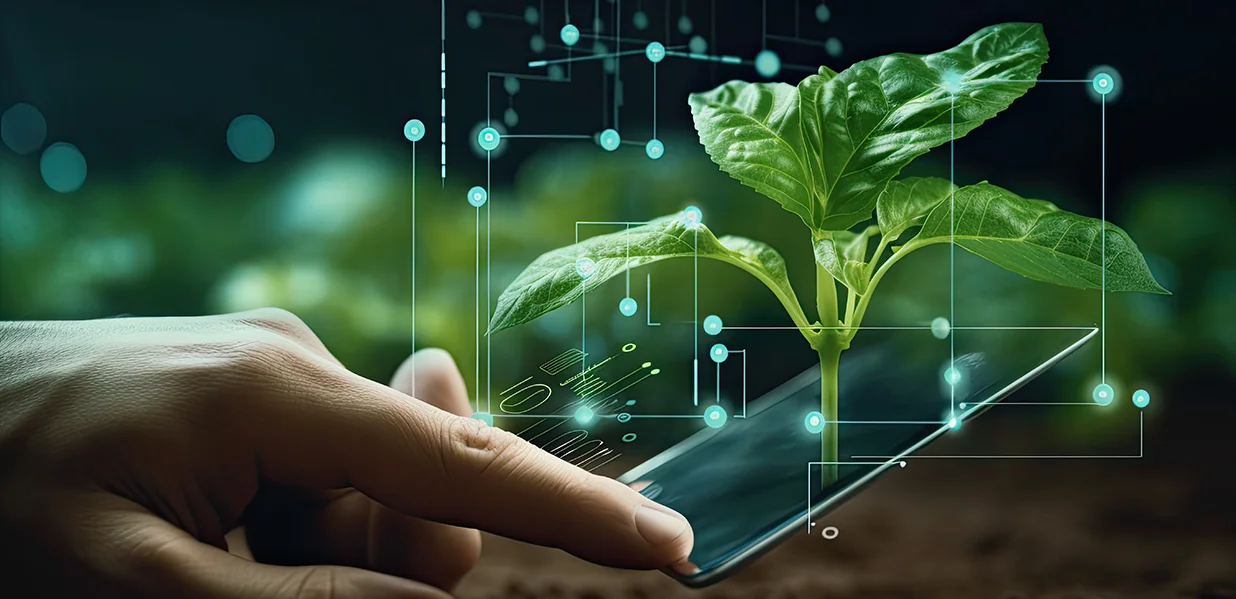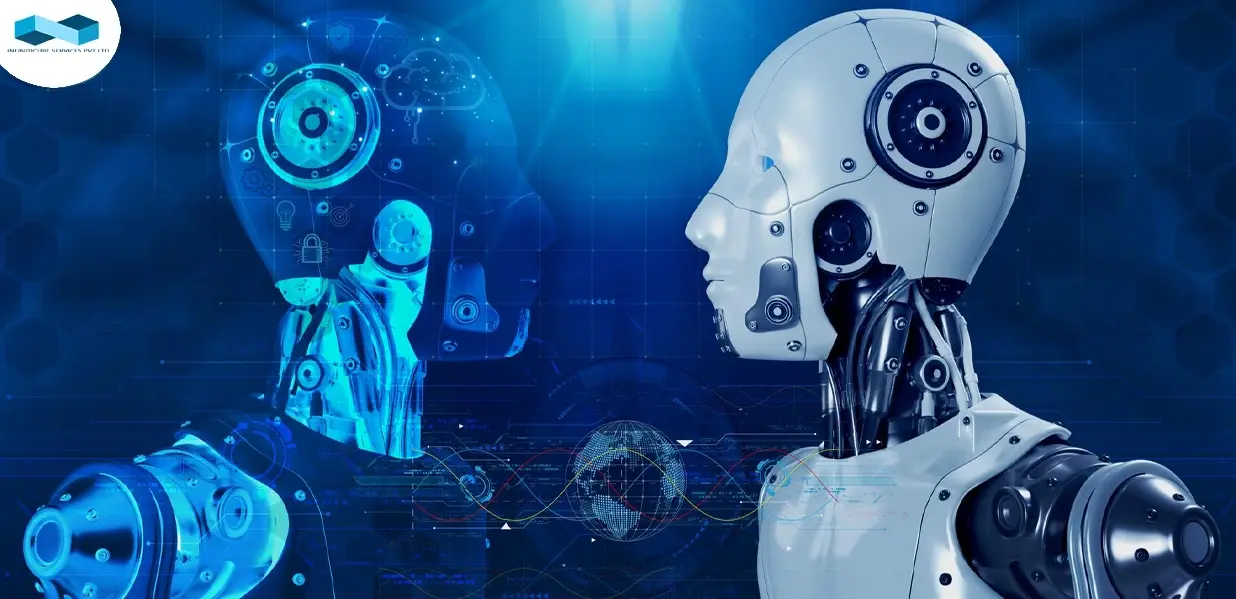15 Innovative Applications of Machine Learning in Agriculture to Maximize Crop Yields
Introduction
Tired of the age-old battle against unpredictable weather, stubborn pests, and soil mysteries that seem unsolvable? Welcome to the frontier of farming's evolution—where tradition meets transformation through Machine Learning in Agriculture.
Alright, so here's the deal: we're facing a big challenge. How can we boost crop yields in a world that's desperate for food? Imagine a perfect world where technology steps in as the ultimate farmer, using Precision Farming, Predictive Modeling, and a whole orchestra of Smart Agriculture Technology.
In this blog, we're diving into some truly amazing advancements that are revolutionizing agriculture. From sustainable practices to cutting-edge automation, these innovations pave the way for New Efficiencies in Crop Yields and are boosting crop yields in ways you wouldn't believe. Get ready to witness the agricultural revolution unfold before your eyes!
1. Precision Agriculture Revolution
Advancements in AI farming optimize farming processes, minimize waste, and maximize efficiency. Precision farming benefits farmers, sustainability, and food security. Customization maximizes plant health and crop quality.
How Machine Learning Enables Precision Farming
- Machine learning enables precision farming in agriculture
- AI systems analyze data for crop decisions, resource optimization
- Predictive analytics aid in forecasting yield outcomes with accuracy
- Big data analytics promotes sustainable farming practices
- Integration of machine learning drives higher productivity and environmental management
Benefits of Precision Cultivation in Optimizing Resource Utilization
- Precision farming uses AI and advanced tech to optimize resource utilization in agriculture
- Benefits include precise input application, reducing wastage and maximizing crop yield
- Drones and satellite imagery assess field variability for optimal resource allocation
- Precision enables efficient machinery usage, leading to cost reductions and increased sustainability
- Personalized treatment at a plant level through data-driven insights enhances resource efficiency
- Targeted approach mitigates risks like disease outbreaks or adverse weather conditions
- Precision farming empowers growers with actionable intelligence for sustainable farming practices
Data-Driven Precision Insights: Optimizing Resources for Sustainable Farming
- Data-driven precision in agriculture revolutionizes sustainable farming
- AI farming optimizes resources for reduced environmental impact and increased crop yields
- Precision agriculture tailors interventions at a granular level
- AI algorithms analyze soil nutrient levels and moisture content for precise treatments
- Predicting crop yield variations allows targeted adjustments in farming practices
- Data-driven insights enable customized decisions for each section of land
- Empowers more sustainable agricultural practices with valuable information
Related Links: Precision Farming and Technology-Driven Agriculture Solutions
2. Smart Agriculture Technology: Smart Irrigation Systems
Overview of ML-driven smart irrigation technology
ML-driven smart irrigation uses AI to optimize crop yield, conserve water, and adapt to changing conditions. It leverages data from sensors and weather forecasts to manage irrigation schedules efficiently.
This technology enhances water efficiency, ensures better crop growth, and minimizes water wastage. It can proactively identify potential crop issues and reduce pesticide usage for sustainable farming practices.
Smart Irrigation Systems: Revolutionizing Water Management
- Smart agriculture tech minimizes water usage and maximizes crop yield
- Sensors detect soil moisture levels for precise water delivery
- Revolutionizes pest control and disease management
- Identifies susceptible areas for targeted pesticide application
- Reduces chemical usage and enhances overall crop quality
AI and Agriculture: Advancements in Sustainable Farming Practices
- AI and smart agriculture improve farming efficiency and environmental responsibility
- Advanced data analytics optimize crop yields, irrigation, and reduce water waste
- AI-powered robotic systems streamline labor-intensive tasks and reduce pesticide use
- Sustainable farming practices gain global momentum, focusing on environmental governance
- AI aids in predictive modeling for disease outbreaks among crops and livestock
- Proactive approach empowers farmers to take preventative measures, reducing the need for chemical interventions
- Smart agriculture tech connects farmers through shared data platforms for collaborative insights
- Aims to create a more informed and sustainable agricultural community
- Rapid advancements in AI offer boundless potential for sustainable farming practices
Irrigation Management with ML
Smart Watering: Irrigation Management with Machine Learning
- Smart Agriculture Technology uses Machine Learning for efficient irrigation management
- ML algorithms optimize water usage based on real-time data, weather, and soil moisture
- Predictive analytics anticipate crop water needs, improving yields and resource utilization
- Real-time data analysis provides insights for informed irrigation decisions
- ML for irrigation is essential for sustainable agriculture in the era of climate change
- ML empowers precision agriculture and can impact global food production
- Integration of ML will shape the future of sustainable and efficient farming practices
3. Automated Pest and Disease Detection: Crop Disease Prediction
AI uses data to predict crop diseases, saving time and resources. Image recognition technology aids diagnosis.
Early Detection Methods for Better Crop Management
- Early detection methods crucial for crop health and productivity
- Smart agriculture tech offers innovative tools for efficient field monitoring
- Drones with multispectral cameras detect nutrient deficiencies, diseases, and pests
- Satellite imagery and AI analyze crop health at large scale for targeted management
- Proactive issue addressing minimizes yield loss and optimizes resource allocation
- Empowers farmers with actionable insights for informed decisions
- Improves crop productivity, sustainability, and reduces environmental impact
Defending Crops: Automated Pest and Disease Detection
- Automated pest and disease detection is revolutionizing crop defense
- AI technology uses drones and ground sensors to monitor fields
- Real-time analysis allows early detection and targeted treatments
- Systems learn to recognize patterns for precise interventions
- Promising future for precision agriculture with automated detection
Sustainable Pest Management: The Role of AI in Agriculture
- AI integration improves pest management in agriculture
- Analyzes weather and pest data for informed pesticide application
- Precision agriculture reduces pesticide use, saves money, and protects ecosystems
- Smart sensors and drones enable real-time pest monitoring and early detection
- Revolutionizes sustainable pest management for eco-friendly, efficient food production
Predictive Modeling for Farming
The potential of predictive modeling in modern agriculture and how AI and machine learning can optimize crop yield, reduce resource wastage, and forecast pest outbreaks. Predictive modeling also revolutionizes supply chain management by aligning with market needs effectively. Overall, it empowers farmers to make data-driven decisions for sustainable and efficient cultivation.
Crop Disease Prediction: Harnessing Predictive Modeling
- Crop disease prediction revolutionizes farming
- AI algorithms anticipate threats and empower preemptive measures
- Analyzing data for accurate predictions leads to efficient resource allocation
- Reduced environmental impact and greater food security worldwide
Predicting Tomorrow's Harvest: Crop Yield Forecasting with ML
- AI farming revolutionizes crop yield forecasting with machine learning
- ML algorithms analyze weather, soil, and historical data for accurate predictions
- Machine learning factors in dynamic variables like pest infestations and disease outbreaks
- Integration of satellite imagery and drone technology enables precise predictions and interventions
- Accurate forecasting assists farmers in decision-making and helps food supply chains anticipate market fluctuations
- ML in agriculture offers exciting possibilities for sustainable and efficient food production
Related Links: Sustainable and Efficient Farm Management: The Future of Agriculture
4. Weed Detection and Management in Farming
AI revolutionizes weed detection and management in farming, improving precision, efficiency, and sustainability. It identifies weeds accurately, minimizing herbicide use and maximizing crop yield.
The technology continuously improves and offers a cost-effective and sustainable solution for farmers. Overall, AI-powered weed management transforms agriculture, promoting sustainable practices and optimizing crop production.
ML applications in identifying and controlling weeds
- AI and machine learning are changing weed control on farms
- ML tools use image recognition to identify and remove weeds without chemicals
- Predictive algorithms anticipate weed growth, reducing labor costs and ecological impact
- Real-time monitoring empowers farmers to make informed decisions
- AI farming tech offers sustainable and eco-friendly weed management practices
Sustainable weed management practices for increased yields
- Sustainable weed management leads to higher crop yields
- AI farming tech allows precise weed control
- Data-driven decisions reduce blanket herbicide use
- Integrated systems combine crop rotation, mechanical cultivation, and biological control
- Holistic approach reduces environmental impact and boosts soil health
- Sustainable practices minimize weed-crop competition and increase yields
5. Predictive Analytics for Weather
Utilizing machine learning for accurate weather predictions
- Machine learning revamps weather predictions and are crucial for climate-resilient crop management
- Algorithms decode intricate weather patterns with precision
- Real-time analysis enhances understanding of climate dynamics
- Empowers farmers with enhanced forecasting models
- Data-driven decision-making transforms farming landscape
- Algorithms analyze terabytes of historical climate data
- Provide nuanced glimpse into the future
Mitigating risks and planning agricultural activities accordingly
- AI-driven agriculture solutions balance risk mitigation and strategic planning in dynamic agriculture
- Algorithms analyze climate, market, and soil data for real-time insights
- Farmers use AI insights to adjust planting schedules and choose resilient crops
- AI algorithms also analyze market trends and fluctuations for strategic decision-making
- Data and cultivation merge to revolutionize agriculture with resilient and forward-thinking solutions
Climate-resilient Crop Management
Weathering the Storm: Climate-resilient Crop Management
- Climate-resilient crop management is crucial for agricultural sustainability amid unpredictable weather
- Machine learning in agriculture uses data to guide crop selection and protect from uncertainties
- Algorithms sift through meteorological data to predict and orchestrate resilient crop choreography
- Machine learning is the guardian of sustainable harvests, navigating meteorological and economic storms
Adapting to Change: Climate-Responsive Agricultural Practices
- Modern agriculture requires adaptation to climate change
- Smart agriculture technology revolutionizes cultivation
- Climate-responsive practices prioritize soil health and water conservation
- Digital tools offer real-time insights for dynamic response to changing weather patterns
- Algorithms and data analytics are integral to sustainable cultivation
- Smart agriculture technology is the guiding force for adaptation in the era of cultivation evolution
Remote Sensing and Monitoring
Eyes in the Sky: Remote Sensing and Monitoring for Agriculture
- Remote sensing and monitoring revolutionize modern agriculture with aerial views and data capture
- Satellite imagery provides insights on crop health, soil moisture, and pest invasions
- Algorithms offer predictive capabilities for farmers
- Technology guides crops through climate challenges, enhancing agricultural practices
Maximizing Insight: Data Monitoring in Agriculture
- Agriculture now relies on big data analytics for insights
- Data deciphers the story of every crop and leaf
- Farmers use data like seasoned sorcerers
- Fields are living datasets revealing secrets through analytics
- Monitored data includes soil, weather, and plant vitality
- Farming is about orchestrating a symphony of data-driven acumen
- Algorithms are sown alongside seeds on modern farms
- Big data is the language of agricultural innovation
- Farmers are maestros conducting a dialogue between tradition and technology
6. Crop Yield Forecasting
How ML models predict crop yields
- ML models optimize crop yields by decoding data-driven insights and predicting patterns
- Algorithms consider weather, soil health, and historical data to create a predictive masterpiece
- Precision sport of farming involves strategically aligning agricultural practices with nature
- Predictive models enable proactive adaptation to changing conditions for calculated agricultural mastery
Benefits for farmers in planning and decision-making
- AI-driven agriculture solutions offer transformative benefits for farmers in planning and decision-making
- AI acts as a precision tool, decoding soil health, weather patterns, and market dynamics
- Predictive AI algorithms provide insight into the future, aiding in navigating uncertainties and optimizing planting schedules
- Farmers can strategically select crops, manage resources efficiently, and navigate market currents with finesse
- It's about cultivating success through technological innovation, turning every decision into a masterpiece of modern agriculture
Related Links: 10 Effective Techniques to Enhance Crop Yields through Agricultural Land Management (in Bullet Points)
7. Autonomous Farming Machinery
The emergence of autonomous farming machinery in modern agriculture, emphasizing efficiency, sustainability, and innovation. It envisions a world where technology transforms traditional farming into a precise choreography, with robotic harvesting and sorting machines showcasing unparalleled finesse.
Additionally, it highlights the role of Irrigation Management with ML in dynamically adapting water distribution.
Integration of machine learning in autonomous farm equipment
- Technological revolution in agriculture: machine learning and autonomous farm equipment
- Solutions to labor scarcity, weather, and resource optimization
- Autonomous farm equipment curates and navigates agricultural landscape
- Integration of machine learning brings intelligence to automation
- Machines anticipate and navigate farming complexities
- Technology and tradition converge in the fields
Enhancing efficiency and reducing labor costs
- Agriculture evolves with technological renaissance for efficiency and cost-effectiveness
- Innovations lead to new efficiencies in crop yields and reduced labor costs
- Autonomous machinery guided by precision algorithms replaces manual labor
- Reduction of labor costs signifies resilience of innovation and reimagined era
8. Soil Health Monitoring in Modern Agriculture
Soil Health Monitoring Systems: ML Applications in Assessing and Maintaining Soil Health
- Machine learning (ML) alters soil health monitoring in modern agriculture
- ML applications act as unseen custodians, analyzing soil data with precision
- Soil health monitoring systems redefine agricultural conversation, harmonizing soil elements through ML algorithms
- ML applications predict and maintain soil health with futuristic finesse
- ML transforms soil health monitoring from reactive to proactive, ensuring soil is nurtured
- Technology, agriculture, and soil unite in a mutually beneficial embrace for a fertile future
Importance of soil health for sustainable agriculture
- Soil health is crucial for sustainable agriculture, influencing fertility, microbial life, and structural integrity.
- Soil health monitoring systems are essential for maintaining delicate equilibrium and preserving fertile land.
- Agriculture is about nurturing the essence of cultivation for a flourishing, resilient earth.
Beneath the Surface: Monitoring Soil Health with AI
- AI advances soil health monitoring
- Soil is dynamic, governed by microbial intricacies, nutrient fluxes, and structural nuances
- AI-driven systems comprehend soil's cryptic language
- Empowers farmers with predictive insights for enduring soil resilience
- Technology and soil science create a new chapter in agriculture
Livestock management is crucial in agriculture. AI solutions optimize care and revolutionize animal farming.
- Machine learning advances livestock care with predictive analytics and data analysis
- Algorithms monitor animal behavior, health metrics, and environmental factors
- Aim is to pre-emptively address health issues and optimize overall well-being
Improving efficiency in animal farming practices
- Animal husbandry efficiency involves holistic livestock welfare, not just productivity
- AI-driven solutions streamline tasks like feeding and disease detection
- Smart monitoring systems use AI to make real-time adjustments to environmental conditions
- The goal is to nurture a mutually beneficial relationship where technology enhances efficiency without compromising animal welfare
AI-driven Agriculture Solutions
- Predicts breeding times and manages grazing patterns efficiently
- Promotes healthier animals and sustainable agricultural practices
10. Supply Chain Optimization: AI's Role in Modern Agriculture
The integration of AI in agriculture supply chains revolutionizes logistics and redefines cultivation and distribution processes.
ML's role in optimizing agricultural supply chains
- ML orchestrates a harmonious agricultural supply chain symphony
- Analyzes data to discern crop yield patterns and market demands
- Predicts harvests and anticipates demand fluctuations
- Dynamically adjusts inventory and optimizes transportation routes
- Ensures judicious resource allocation and efficient, predictive farm-to-table journey
Enhancing transparency and reducing waste in the supply chain
- Transparency in agricultural supply chain facilitated by AI and blockchain tech
- Blockchain ensures immutable ledger for traceability from farm to consumer
- AI algorithms identify and reduce inefficiencies in storage, transportation, and processing
- Aims to enhance traceability, enable informed consumer choices, and reduce waste
Related Links: Aeroponic Farming: Agriculture with Vertical Farming Technology
Overview of robotic applications in agriculture
- Agri-robotics revolutionizing modern agriculture
- Integrating precision and efficiency in planting, harvesting
- Drones monitor crop health with aerial precision
- Autonomous tractors plow fields with surpassing accuracy
- Robotic technology in agriculture is groundbreaking, ensuring surgical precision in every task
Improving efficiency in planting, harvesting, and other tasks
- Agri-robotics improves agricultural efficiency and precision
- Robotic seeders ensure precise seed spacing and depth
- Robotic arms delicately harvest fruits, minimizing waste and damage
- Agri-robotics benefits all agricultural tasks, including weeding and monitoring
Robotic Harvesting and Sorting
Robotic Revolution: Harvesting and Sorting with Precision
- Agricultural landscape shifting with robotic harvesting and sorting
- Robotic maestros navigate fields with precision, transforming harvesting into digital art
- Revolution infuses every harvest with accuracy, reduces reliance on seasonal labor fluctuations
From Field to Table: Robotic Applications in Agriculture
- Robotic applications transform agricultural produce journeys, enhancing efficiency and quality.
- Robotic sorting systems streamline manual tasks, ensuring only the best produce reaches consumers.
- Agri-robotics promise sustainable, efficient, and precise cultivation, ensuring high-quality produce reaches tables.
12. Sustainable Pest Management in Agriculture: Nurturing Crops with Precision
The sustainable pest management in agriculture using machine learning (ML) to minimize reliance on chemical pesticides.
Reducing the reliance on chemical pesticides
- Agricultural community seeks sustainable alternatives, reducing reliance on chemical pesticides
- ML-driven pest management minimizes need for traditional chemical interventions
- ML algorithms enable adoption of integrated pest management strategies
- Emphasizes natural predators, crop rotation, biological controls for holistic pest mitigation
- Shifts towards more ecologically balanced and sustainable agricultural ecosystem
- ML solutions conduct precision and sustainability in sustainable pest management
- Technology and agriculture harmonize for proactive, nurturing crop care
- Fields transform into resilient canvas, reducing reliance on chemical pesticides
13. Digital Twins in Agriculture: Cultivating the Future of Farming
Digital twins, a technological marvel in agriculture, replicate physical entities. It extends into farming, revolutionizing agricultural practices.
Exploring the concept of digital twins in farming
- Digital twins in farming are virtual replicas of agricultural assets
- They mirror physical entities with precision and capture real-time data
- Digital twins replicate spatial dimensions and assimilate data on soil composition, moisture levels, and environmental conditions
- Farmers gain unprecedented insights and navigate land intricacies with digital twins
- Livestock also have digital twins with information on health, behavior, and nutritional needs
Benefits in monitoring and managing crop development
- Digital twins benefit agriculture by monitoring and managing crop development
- They provide real-time updates on crop health, growth rates, and stressors
- They enable simulation of different scenarios for precision crop management
- Facilitate proactive measures, reducing reliance on reactive interventions and enhancing resilience
14. Farm Management Software
The digital revolution in modern agriculture driven by Farm Management Software (FMS). FMS utilizes machine learning to orchestrate agricultural tasks with precision and foresight.
How ML-powered software enhances farm management
- ML in farm management is a paradigm shift in agriculture
- ML algorithms analyze data and extract insights
- Software assimilates real-time data on soil, weather, and crop health
- Offers granular understanding of agricultural landscape
- Predicts crop yields, pest infestations, and optimal planting times
- Enables informed decisions beyond human intuition
Streamlining tasks and improving decision-making
- Farm management software streamlines tasks and improves decision-making in modern agriculture.
- Digital precision transforms planting and harvesting into data-driven processes.
- ML algorithms optimize planting patterns and predict optimal harvest times.
- Software empowers farmers with data-driven insights for inventory management and financial planning.
- It's a transformative force that combines technology with traditional farming wisdom.
- Digital evolution in agriculture through Collaborative Farming Platforms
- Machine learning (ML) enhances farming efficiency and resilience
- ML-driven platforms analyze large datasets for predictive insights
- Predict optimal planting times, detect pest outbreaks
- ML transforms collaborative farming into precision symphony
Connecting farmers, sharing insights, and fostering community
- Collaborative farming platforms connect farmers worldwide
- Farmers share insights, challenges, and triumphs
- Platforms facilitate sharing of experiences and knowledge on agricultural challenges
- Creates a sense of community resilience in agricultural complexities
Big Data Analytics for Farming
Farming Smarter, Not Harder: Big Data in Agricultural Innovation
- Big Data Analytics revolutionizes agriculture, guiding farmers through complex decision-making
- Data from soil compositions to weather patterns used to extract insights
- Predictive modeling optimizes resource allocation and mitigates risks, fostering a proactive era in agriculture
Related Links: 7 Ways Edge and Cloud Computing are Enhancing Agricultural Productivity
Conclusion
Highlights:
- Technology in farming continuously evolves, reshaping agriculture with precision agriculture as a key driver.
- Drones play a crucial role in data collection, using thermal imaging and sensors for insights.
- Machine learning empowers farmers with predictive analytics, decoding soil composition and crop behavior for foresight.
- Digital twins extend to farming, creating virtual counterparts for fields, livestock, and farms
- Real-time dynamic representations offer current insights and navigation of agricultural challenges
- Collaborative platforms connect farmers, fostering shared knowledge and mutual support
- Big data analytics illuminate the path of agricultural innovation
- Data interpretation transforms practices for sustainability and efficiency
- Technology in farming signifies resilience, adaptability, and commitment to nourishing the world
- Future agriculture integrates technology and tradition for excellence and sustainability
- Digital progress intertwined with crop cultivation creates a promising horizon
 June 27, 2025
June 27, 2025
 Balbir Kumar Singh
Balbir Kumar Singh
 0
0
 June 13, 2025
June 13, 2025
 Balbir Kumar Singh
Balbir Kumar Singh
 0
0









Leave a Reply